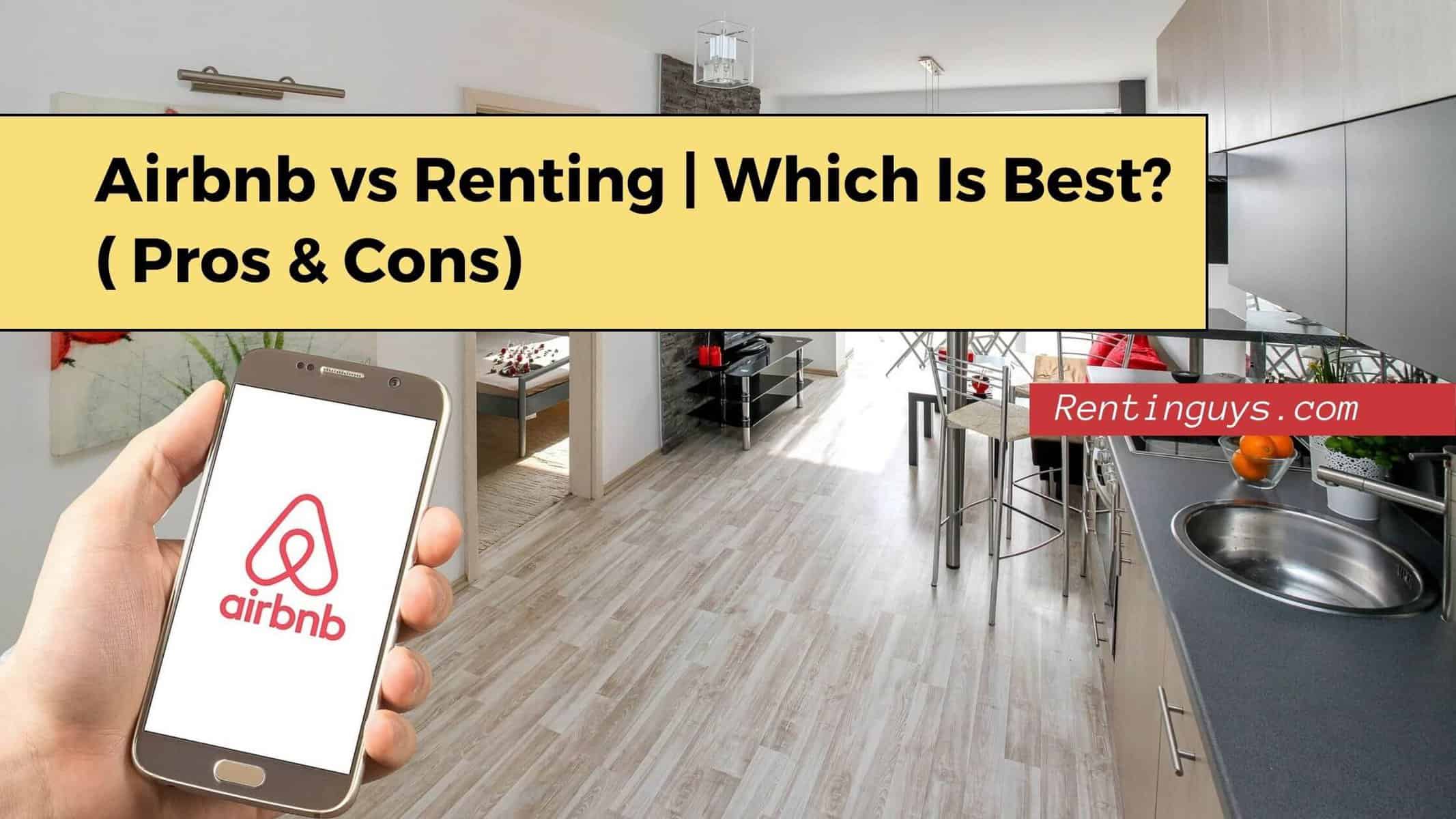Airbnb Vs Renting is a significant decision both for property owners and tenants.
Property owners have to decide whether to list their property on Airbnb for short-term rentals or opt for traditional renting.
Tenants have to decide whether to rent a vacation home through Airbnb or go for a traditional rental.
Airbnb Vs Renting for owners
A survey by VRM intel says that 45% of property owners buy property to generate income by renting it.
With the vacation home rental market booming, homeowners need help deciding which choice will give them higher returns and which is safer.
Airbnb Vs Renting
| Airbnb | Renting | |
| What? | Airbnb is a website that allows property owners to list their homes on the platform. You can connect with travelers and give your home on a short-term rental. Airbnb markets your property and collects the rental. | In renting, you will be marketing your home or hiring a property manager to market the home and find tenants. You or the property manager have to collect the rentals. |
| Pricing | Pricing is flexible on Airbnb. You can alter the property prices according to the supply and demand situation in your location. | Renting does not give you flexibility. The rent is fixed for a time frame, I.e six months, a year, etc. Tenants will pay rent that is fixed in the lease agreement. |
| Stability | The income is not stable while renting a property on Airbnb. You may get higher income during the peak season, and low income during the off-season. | Renting guarantees a stable income as the rent amount is fixed and the tenants have to pay it regularly as per the lease agreement. |
| Expenses | The expenses are slightly higher as you have to maintain the house in perfect condition to attract travelers. The operational expenses are high as you may be required to restock and replace certain items whenever new guests check-in. In addition, you have to pay a service charge to Airbnb. | In traditional renting, the expenses are divided between the tenant and the owner. While you have to provide the basic amenities like water, sewage, and heating/cooling, you need not provide daily-use items such as towels, bedding, etc. If you hire a property manager, you have to pay their service charges. |
| What utilities and amenities to provide? | Airbnb hosts must provide high-quality furniture, clean bedding, nice decor, towels, toiletries, a kitchen with basic groceries like salt, sugar, tea, coffee, etc. cable TV, and Wi-Fi, along with basic amenities including heating/cooling equipment, water, and trash removal. | In renting, you only have to provide basic amenities like water, sewage, trash removal, garden maintenance, and general property maintenance. |
| Taxation | In the US, Airbnb hosts have to pay occupancy tax along with the Federal and state income tax | Rental income is included in your tax returns but property owners get more concessions on the expenses incurred for property maintenance |
| Insurance | As different guests will visit the property, it may suffer higher damages. You may need to take vacation rental insurance to cover any damage. | Landlords in the traditional renting lease will need to take a landlord policy or commercial insurance policy. |
| Regulations | Some cities have strict rules for short-term rentals on Airbnb. Example: New York City and Washington You may have to apply for a permit to become an Airbnb host in some cities. | Traditional renting is governed by federal and local housing laws. |
Airbnb and renting, both have their pros and cons. You have to compare them and make a decision that suits your circumstances.
For example, if you own property in a tourist town, Airbnb will be the right choice whereas if you have a home in a regular city with low tourists, traditional renting is more suitable.
You must also take into consideration, the local housing laws before making the final choice
Is renting your house on Airbnb worth it?
The answer to this question depends on many factors such as your location, the local housing laws, the demand and supply scenario for vacation rentals, and your personal expectations.
The pros of renting your house on Airbnb are
- Higher-income – As the nightly rates on Airbnb are higher than traditional renting, you can earn a higher income. You can also sell additional services to the guest, which can generate extra income.
- Flexible pricing – The pricing can be adjusted according to the demand and season. You can charge higher during the peak holiday season or weekends, and offer discounts during the low season.
- House rules – You can set house rules for the guests and complain to Airbnb if they violate the rules.
- Host guarantee for Airbnb – Airbnb Host Guarantee offers $1 million protection to hosts.
The Cons of renting your house on Airbnb are
- Higher expenses – The expenses are higher as you have to pay a service charge to Airbnb and ensure that the house is in perfect condition at all times. You must provide additional amenities such as well stocked kitchen, clean bed linens, fresh decor, wi-fi, and cable TV to make your property stand out and attract guests.
- High insurance – Most insurance companies charge higher premiums on Airbnb properties as they consider the risk to be higher. As you have more guests on the property, the chances of damages are also higher. You may need to take additional insurance.
- Strict laws – Many major cities have imposed strict laws on Airbnb properties. Moreover, your housing corporation may also have regulations such as noise controls, night curfew, etc.
- Irregular income – Unlike traditional renting, your income will not be fixed. Rentals vary depending on many factors such as tourist seasons, events, proximity to tourist attractions, etc. The property may be fully booked during the holidays and may lie vacant during the off-season. Sometimes, local regulations may force you to keep the property vacant.
Airbnb requirements to rent: Things to consider before becoming a host:
If you are considering listing your property for short-term rentals on Airbnb, here are a few things to keep in mind
- First and foremost, know the rules and regulations of your city regarding Airbnb.
- Know the community regulations for Airbnb
- Assess your property: Location, Size of the property, condition of the property, amenities available, etc.
- Think whether you are ready to invest the money, time, and energy to keep the property in perfect condition throughout the year
- Decide whether you will maintain the property yourself or hire a property management company
- Compare the rentals for similar properties in your area
- Assess the demand for holiday rentals
- Fix a nightly price for the property
- Click appealing pictures of the property and write engaging captions and descriptions to entice the guests
- List your property on Airbnb
Airbnb Vs Renting For Tenants
Airbnb Vs renting is a raging debate for tenants. Living in an Airbnb may seem easy and glamorous but it is not the case always, especially when you are planning to stay long-term.
It is important to make yourself aware of the advantages and disadvantages of Airbnb before making the final decision.
Can you permanently live in an Airbnb?
Airbnb is popular for short-term vacation rentals, but you can also book long-term rentals through the platform.
According to the latest statistics, over 80% of hosts on Airbnb accept long-term bookings. Moreover, they provide discounts for longer stays.
A stay over 28 days is considered a long-term rental and charged accordingly. All the policies of Airbnb such as the refund policy, cancellation policy, payment terms, etc. are different for long-term bookings. You have to be aware of these policies before deciding to permanently live in an Airbnb.
It is important to note that all the properties on Airbnb do not offer long-term rentals. You have to choose hosts that are accepting long-term guests.
Is it worth living in Airbnb instead of renting
Living in an Airbnb has a lot of advantages such as
- The price of renting on Airbnb can be cheaper than traditional renting when you factor in the discounts and deals offered by the hosts and the points you can earn by using several offers on the platform.
- You can live in fully furnished flats with the latest amenities and facilities. You need not worry about paying the utility bills, maintenance, etc. as everything is added to the price.
- Booking an Airbnb is simple. You create an account and search for properties in your desired location for your desired dates.
- You get the flexibility to move whenever you want as there is no lease agreement. You can cancel the stay with advance notice and get a refund.
- Renting an Airbnb does not require much paperwork and background checks.
- Airbnb provides 24 hours support to guests. So if something goes wrong, you can immediately contact the host or Airbnb support.
The cons of living through Airbnb are
- Last-minute cancellations by hosts can be a hassle
- Additional fees such as cleaning fees, service fees, etc. can add up to the costs
- Airbnb has a strict cancellation policy for guests. You may end up losing money if you cancel the booking at the last minute.
- The service is not consistent. While some hosts are excellent, others are not up to the mark.
- The photos of the property may be misleading.
It is worth living in an Airbnb if you get the house at a lower price than the traditional rental, the hosts are responsive and the additional fees are low.
Can Airbnb Host kick you out during your stay?
Yes, Airbnb hosts can evict you during your stay. Generally, hosts ask guests to move out if they do not adhere to the house rules, bring in more guests than mentioned, indulge in unlawful activities, or cause damage to the property.
Do you have to clean when you leave Airbnb?
Most Airbnb hosts charge a cleaning fee, which averages between $50 to $80.
This cleaning fee includes the costs of cleaning products, toilet rolls, washing and drying linens, toiletries, and the cost of cleaning the property after you vacate.
It is recommended to ensure that the property is clean and tidy when you are leaving. You must make sure to hand over the house in the same condition as you received it.
For example, you must wash the dishes, dry them and place them neatly, empty the trash can and place them in the right spot, and ensure that you do not leave any cooked food or waste behind,
Airbnb Vs renting is a debate, where everyone has to take their call after knowing the pros and cons of both options. There is no one size fits all answer to the question.



